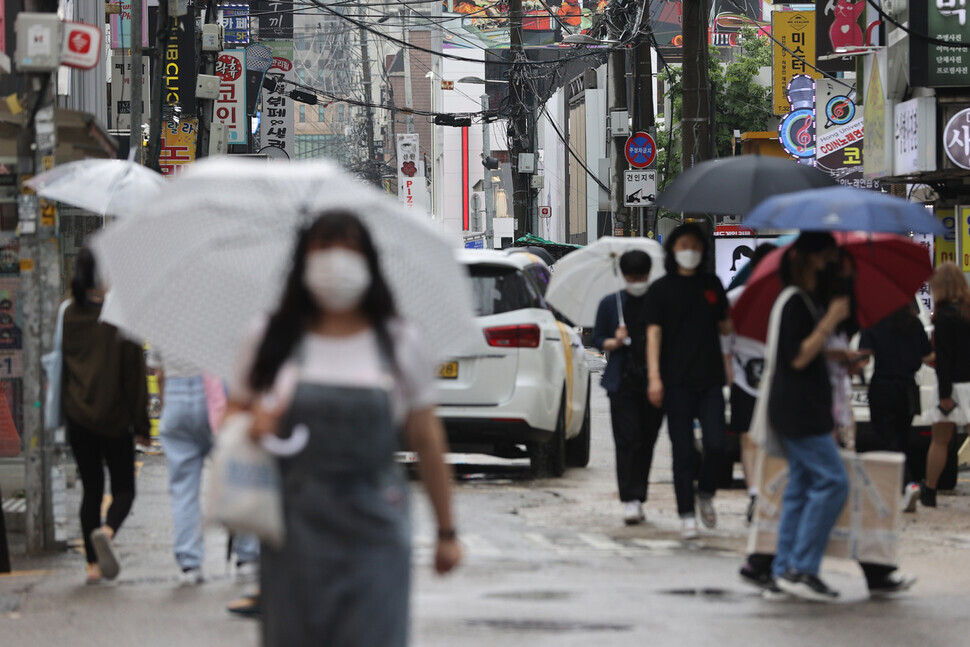hankyoreh
Links to other country sites 다른 나라 사이트 링크
Delta variant accounts for 7% of COVID-19 cases in S. Korea

Seven out of a hundred people who test positive for the coronavirus in South Korea have the Delta variant, the country’s disease control authorities said. But when imported cases are excluded, Delta’s share of the total drops to about 2.2% because Delta accounts for a large percentage of imported cases.
“This figure isn’t precise because we’re working with samples, but around seven of every 100 people who contract COVID-19 in the country have the Delta variant,” said Son Young-rae, director of strategy and planning at Korea’s Central Disaster Management Headquarters, during an interview on “Kim Ou-joon’s News Factory,” a TBS radio program, on Monday.
That was what scientists learned when they analyzed a sample of about 15% of all COVID-19 cases.
The previous day, Korea’s Central Disease Control Headquarters said that Delta represented 7% of all COVID-19 cases reported between June 1 and June 26, but that the rate falls to 2.2% when imported cases are omitted from the sample.
Seoul said it believes Delta is spreading faster than other virus variants.
“Delta isn’t predominant yet, but it’s on the rise. Considering that Delta has increased from 1% of infections two months ago to 7% today, we think it spreads more quickly than other variants,” said Son.
The Delta variant combines Alpha, a major mutation that originated in the UK, with parts of the Epsilon variant. Delta is reportedly 60% more transmissible than Alpha, which is already a quickly spreading variant.
Delta’s share of COVID-19 cases caused by the four major variants (the others are Alpha, Beta, and Gamma) rose from 7.3% in April to 12.8% in May and then to 18.2% last month.
On Sunday, the South Korean government announced tougher disease control measures for the greater Seoul area after concluding that COVID-19 (including the Delta variant) has been spreading rapidly there in recent days. Those measures increase the sample to be analyzed for variants from 15% to 20% outside the capital area and to 25% inside that area.
The authorities are also recommending that vaccinated people in the capital area continue wearing masks both inside and outside and are banning the consumption of alcohol in parks and on the riverside after 10 pm.
Son offered the following explanation for the authorities’ change of policy on mask guidelines in the greater Seoul area.
“In terms of psychological factors and communication, such steps [waiving the requirement to wear masks outside] could foster complacency about disease control. Given the severity of the situation around Seoul, we’re asking even those who’ve already been vaccinated to continue wearing masks outside as before.”
Son said that the drinking ban is “aimed at resolving the issue of more people drinking outside when restaurants and cafés close at 10 pm.”
Son added that the ban would be implemented through administrative orders and the adjustment of local ordinances.
By Kim Ji-hoon, staff reporter
Please direct comments or questions to [english@hani.co.kr]

Editorial・opinion
![[Column] Park Geun-hye déjà vu in Yoon Suk-yeol [Column] Park Geun-hye déjà vu in Yoon Suk-yeol](https://flexible.img.hani.co.kr/flexible/normal/500/300/imgdb/original/2024/0424/651713945113788.jpg) [Column] Park Geun-hye déjà vu in Yoon Suk-yeol
[Column] Park Geun-hye déjà vu in Yoon Suk-yeol![[Editorial] New weight of N. Korea’s nuclear threats makes dialogue all the more urgent [Editorial] New weight of N. Korea’s nuclear threats makes dialogue all the more urgent](https://flexible.img.hani.co.kr/flexible/normal/500/300/imgdb/original/2024/0424/7317139454662664.jpg) [Editorial] New weight of N. Korea’s nuclear threats makes dialogue all the more urgent
[Editorial] New weight of N. Korea’s nuclear threats makes dialogue all the more urgent- [Guest essay] The real reason Korea’s new right wants to dub Rhee a founding father
- [Column] ‘Choson’: Is it time we start referring to N. Korea in its own terms?
- [Editorial] Japan’s rewriting of history with Korea has gone too far
- [Column] The president’s questionable capacity for dialogue
- [Column] Are chaebol firms just pizza pies for families to divvy up as they please?
- [Column] Has Korea, too, crossed the Rubicon on China?
- [Correspondent’s column] In Japan’s alliance with US, echoes of its past alliances with UK
- [Editorial] Does Yoon think the Korean public is wrong?
Most viewed articles
- 1‘We must say no’: Seoul defense chief on Korean, USFK involvement in hypothetical Taiwan crisis
- 2Will NewJeans end up collateral damage in internal feud at K-pop juggernaut Hybe?
- 3[Column] Park Geun-hye déjà vu in Yoon Suk-yeol
- 4Why Korea shouldn’t welcome Japan’s newly beefed up defense cooperation with US
- 5Thursday to mark start of resignations by senior doctors amid standoff with government
- 6N. Korean hackers breached 10 defense contractors in South for months, police say
- 7[Guest essay] The real reason Korea’s new right wants to dub Rhee a founding father
- 8[Column] ‘Choson’: Is it time we start referring to N. Korea in its own terms?
- 9Kim Jong-un expressed ‘satisfaction’ with nuclear counterstrike drill directed at South
- 10[Editorial] New weight of N. Korea’s nuclear threats makes dialogue all the more urgent